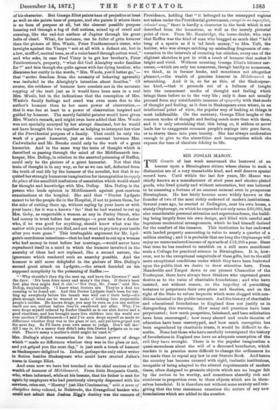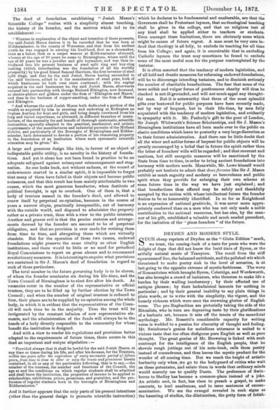SIR JOSIAH MASON.
THE Gazette of last week announced the bestowal of an honour upon a Birmingham citizen whose claims to such a distinction are of a very remarkable kind, and well deserve special record here. Until within the last few years, Mr. Mason was chiefly known as a manufacturer of steel pens and electro-plated goods, who lived quietly and without ostentation, but was believed to be amassing a fortune of an amount unusual even in prosperous Birmingham. He has lately become more widely known as the founder of two of the most richly endowed of modern institutions. Several years ago, he erected at Erdiugton, near his own house, a stately Orphanage, on which he expended not only some £60,000, but also considerable personal attention and superintendence, the build- ing being largely from his own design, and filled with careful and ingenious mechanical arrangements, which he had himself devised for the comfort of the inmates. This institution he has endowed with landed property amounting in value to nearly a quarter of a million sterling; and it is probable that ere long the Orphanage will enjoy an unencumbered income of upwards of £12,000 a year. Since that time he has resolved to establish on a still more munificent scale a College for practical science in Birmingham. It is, how- ever, not to the exceptional magnitude of these gifts, but to the still more exceptional conditions under which they have been bestowed upon the public that we desire to draw attention here. From Mandeville and Turgot down to our present Chancellor of the Exchequer, there have always been thinkers who expressed grave doubts as to the value of charitable foundations ; and who have insisted, not without reason, on the impolicy of permitting testators to perpetuate their own plans and theories, and on the right of the State to refuse bequests which were clogged with con-' ditions inimical to the public interests. And the history of charitable and educational foundations in England does not justify us in disregarding this warning. How many evil practices have been perpetuated ; how much pauperism, falsehood, and base solicitation have been encouraged ; how many absurd and crude theories of education have been stereotyped, and how much corruption has been engendered by charitable trusts, it would be difficult to de- scribe. None butthoee who have carefully investigated the history of foundations in England can have an adequate conception of the evil they have wrought. There is in the popular imagination a quasi-sacredness about the will of a deceased benefactor, which renders it in practice more difficult to change the ordinances he has made than to repeal any law in our Statute Book. And hence the country has become covered with rigid, inelastic institutions, incapable of being adapted to the altered requirements of modern times, often designed to promote objects which are no longer felt by the nation to be worthy, and sometimes absurdly rich and cumbrous in proportion even to those objects which are in them- selves beneficial. It is therefore not without some anxiety and mis- giving that the true statesman examines the nature of any new foundations which are added to the number.
The deed of foundation establishing " Josiah Mason's Scientific College" recites with a simplicity almost touching, the history of its founder, and the motives which led to its establishment :-
"Whereas in explanation of the object and intention of these presents, the said Josiah Mason desires it to be recorded that he was born at Kidderminster, in the county of Worcester, and that from his earliest youth be was engaged in earning his livelihood, first as a shoemaker, then as a baker, then as a carpet weaver at Kidderminster aforesaid, whence at the age of 20 years he came to Birmingham, where until the age of 30 years he was a jeweller and gilt toymaker, and was then in- troduced into his present business of steel split ring and key-ring making (which introduction was the foundation of all his worldly prosperity) by his good friend Samuel Harrison, the first inventor of steel split rings, and that he the said Josiah Mason having succeeded to the said business, added to it the manufacture of steel pens, both of which businesses he hath ever since continued ; with the capital acquired in the said businesses be, the said Josiah Mason, afterwards entered into partnership with George Richard Elkington, now deceased, as electro-platers and gliders under the firm of Elkington and Mason,' and then in the business of copper-smelting, under the firm of Mason and Elkington.
"And whereas the said Josiah Mason hath dedicated a portion of the wealth so acquired by him in erecting and endowing at Erdington an Orphan Asylum for boys and girls, and being deeply convinced from his long and varied experience, as aforesaid, in different branches of manu- facture, of the necessity for and benefit of thorough systematic, scientific instruction, specially adapted to the practical, mechanical, and artistic requirements of the manufactures and industrial pursuits of the Midland district, and particularly of the Boroughs of Birmingham and Kidder- minster, bath determined to devote a portion of his remaining property to the foundation of an institution where such systematic scientific education may be given," etc.
A large and generous design like this, in favour of an object of indisputable public utility, is no novelty in the history of founda- tions. And yet it alone has not been found in practice to be an adequate safeguard against subsequent mismanagement and stag- nation. As one looks back, not without sadness, at the record of endowments started in a similar spirit, it is impossible to forget that many of them have failed in their objects and become public nuisances, and that this result has been mainly attributable to two causes, which the most generous benefactor, when destitute of political foresight, is apt to overlook. One of them is, that a body of trustees named in the founder's deed, and allowed to renew itself by perpetual co-optation, becomes in the course of years a narrow clique, practically irresponsible, out of harmony with the outside world, and disposed to administer the property rather as a private trust, than with a view to the public interests. Another and graver evil is that the precise statutes and arrange- ments decreed by the founder are assumed to be of perpetual obligation, and that no provision is ever made for revising them from time to time, and abrogating those which are virtually obsolete. But for the operation of those two causes, endowed foundations might preserve the same vitality as other English institutions, and there would be little or no need for periodical Royal Commissions to report on gross abuses and to recommend revolutionary measures. It is interesting to enquire what provisions are contained in Sir J. Mason's deed of foundation in regard to each of these particulars.
The total number in the future governing body is to be eleven, of whom the founder nominates six during his life-time, and the Town Council of Birmingham is to elect five after his death. As vacancies occur in the number of the representative or official trustees, they are to be filled up by further erection by the Town Council ; and when the number of original trustees is reduced to four, their places are to be supplied by co-optation among the whole body, in which it is evident that the representatives of the Coun- cil will each time be in the majority. Thus the trust will be invigorated by the constant infusion of new representative ele- ments, and the administration of the funds will always be in the hands of a body directly responsible to the community for whose benefit the institution is designed.
And with a view to render his regulations and provisions better adapted to the requirements of future times, there occurs in this deed an important and unique stipulation :—
" Provided always that it shall be lawful for the said Josiah Mason, at any time or times during his life, and after his decease, for the Trustees, within two years after the expiration of every successive period of fifteen years, from time to time to alter or vary the trusts and provisions herein contained, in all or any of the particulars following, that is to say,—the number of the trustees, the number and functions of the Council, the age at and the conditions on which regular students shall be admitted and shall leave the institution, the proportion of income to be applied to scholarships, exhibitions, prizes, premiums, and gratuities, and the pre- ference of regular students born in the boroughs of Birmingham and Kidderminster."
And it further appears that the only parts of his present intentions (other than the general design to promote scientific instruction) which he declares to be fundamental and unalterable, are that the Governors shall be Protestant laymen, that no theological teaching shall be given in the college, and that no religious test of any kind shall be applied either to teachers or students. Even amongst these limitations, there are obviously some which might be causes of future regret. A man must be very sure in- deed that theology is all folly, to exclude its teaching for all time from his College ; and again, it is conceivable that in excluding Catholic laymen the trust may sometimes be found to exclude some of the most useful men for the purpose contemplated by the testator.
It is often asserted that the tendency of modern legislation, and of all bold and drastic measures for reforming endowed foundations, will be to dificourage intending testators, and to diminish seriously the number of charitable benefactions. The fear that some of the more selfish and vulgar forms of posthumous charity will thus be checked is not ill grounded, and will not much appal any thought- ful man. But it is noteworthy that three of the most splendid gifts ever bestowed for public purposes have been recently made, not by way of bequest, but in their life-time, by men fully acquainted with the tendency of modern legislation, and evidently in sympathy with it. Mr. Peabody's gift to the poor of London, Sir Joseph Whitworth's Science Scholarships, and Sir J. Mason's Birmingham institutions have all been made over to the-public on elastic conditions which leave to posterity a very large discretion as to their future administration. And there can be little doubt that all the wiser and nobler forms of bequest for public objects will be greatly encouraged by a belief that in future the spirit rather than the letter of founders' wills will be regarded ; and that reverent and cautious, but still energetic measures will be sanctioned by the State from time to time, in order to bring ancient foundations into harmony with modern needs. Meanwhile, Mr. Lowe himself would probably not hesitate to admit that dona ferentes like Sir J. Mason exhibit as much sagacity and modesty as benevolence and public spirit when they provide for enlarging their own scheme at some future time in the way we have just explained ; and that benefactions thus offered may be safely and thankfully accepted by the nation with whose intellectual future the founder desires to be so honourably identified. In so far as Knighthood is an expression of national gratitude, it was never more appro- priately conferred than on a man who has not only made a noble contribution to the national resources, but has also, by the man- ner of his gift, established a valuable and much needed precedent, for the imitation of the "pious founders " of the future.











































 Previous page
Previous page